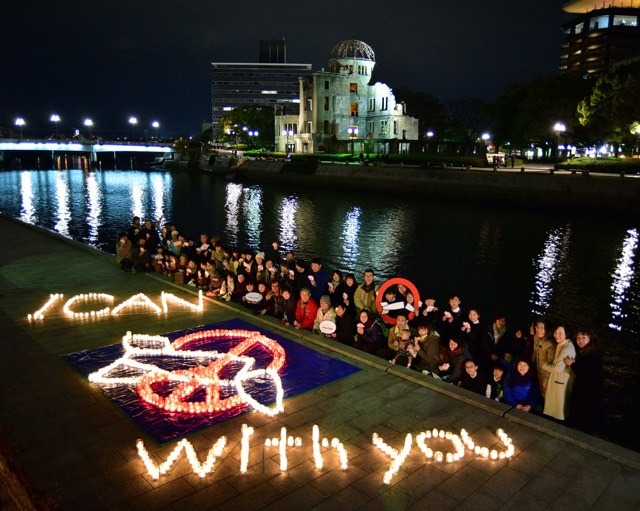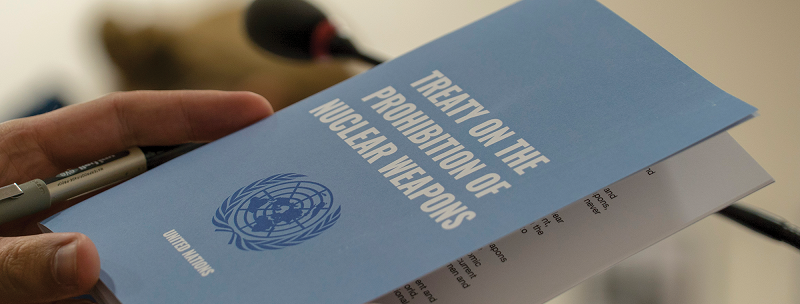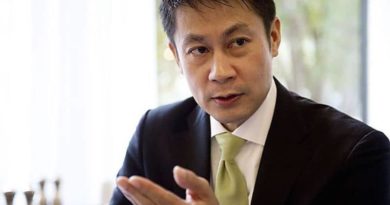So we banned nuclear weapons. What’s next?
December 16, 2020
On Oct. 24, 2020, just a few months after the 75th anniversary of the atomic bombings of Hiroshima and Nagasaki, Honduras became the 50th country to ratify the Treaty on the Prohibition of Nuclear Weapons (TPNW). That means 90 days later, on January 22, 2021, the treaty will enter into force as international law.
Adopted at the UN in July 2017, the TPNW is a comprehensive ban on nuclear weapons, including their use, testing, manufacturing, possession, stationing, and transfer. Although ratifications have just now reached 50, the treaty has 84 signatories, and 122 nations voted in favor of its adoption.
Countries that have already ratified the TNPW include Ireland, New Zealand, Mexico, and South Africa, the latter being the only country to have built its own nuclear weapons but then disarmed. A number of small island nations — such as Kiribati, which was used as a nuclear test site — have also ratified. Nuclear weapons states and those under their nuclear umbrellas, including Japan, refuse to partake.
In Hiroshima, hibakusha (A-bomb survivors), local politicians, and civil society welcomed the TPNW’s entry into force and urged the Japanese government to join the treaty without delay.
Breaking through disarmament gridlock
Two major factors spurred the creation of the TPNW: disarmament gridlock under the NPT and a renewed focus on the humanitarian impact of nuclear weapons.
Under Article VI of the NPT, each of the parties “undertakes to pursue negotiations in good faith on effective measures relating to cessation of the nuclear arms race at an early date and to nuclear disarmament.” However, half a century after the NPT’s creation, nuclear weapons states have not made significant progress toward fulfilling their obligations.
But why should a handful of men in a handful of nations be allowed to threaten mass destruction on the rest of the world? Though rightly called a cornerstone of global nonproliferation, it was clear to many that the NPT was also enabling an undemocratic imbalance of power on an issue that impacts every citizen.
Launched in 2007, the International Campaign to Abolish Nuclear Weapons (ICAN) began mobilizing civil society groups and sympathetic governments in support of a ban treaty. In a nutshell, the campaign aims to use international law to change global norms and put pressure on nuclear weapons states, with the ultimate goal of total abolition. ICAN modeled its activities on previous successful campaigns to ban landmines and cluster munitions.
Also central to ICAN’s movement is the humanitarian impact of nuclear weapons. That includes, of course, nuclear weapons’ use in war, but also the lasting damage caused by their production and testing to human bodies, communities, and the environment.
Among its various activities, ICAN generated momentum for a ban treaty through three major international conferences held in Oslo, Nayarit, and Vienna in 2013–14 that brought together hibakusha, experts, and various civil society and government actors. Calls grew for the UN to hold negotiations for a ban treaty.

On the day of the TPNW’s adoption, July 7, 2017, hibakusha and ICAN collaborator Setsuko Thurlow gave a speech before the gathered diplomats and civil society representatives.
“To the leaders of countries across the world, I beseech you — if you love this planet, you will sign this treaty,” she said. “Nuclear weapons have always been immoral. Now they are also illegal.”
The TPNW and Japan
Roughly a month after the TPNW was adopted, in his 2017 peace declaration Nagasaki Mayor Tomihisa Taue called Japan’s boycott of the treaty negotiations “incomprehensible to those of us living in the cities that suffered atomic bombings.”
Hiroshima Mayor Kazumi Matsui used a milder tone, calling on his government to do “everything in its power to bridge the gap between the nuclear-weapon and non-nuclear-weapon states, thereby facilitating the ratification of the Treaty on the Prohibition of Nuclear Weapons.” (By now, explicit calls for the Japanese government to sign and ratify the TPNW are a staple of both cities’ peace declarations.)
The TPNW has brought Japan’s contradictory policy on nuclear weapons — paying lip service to disarmament while remaining snugly nestled under the U.S.’s nuclear umbrella — into sharp relief. Hibakusha, including Thurlow, have expressed feelings of betrayal at Japan’s refusal to join the treaty.
The first TPNW states parties meeting will convene within a year of the treaty’s entry into force, and Japanese campaigners and sympathetic politicians have called on their government to at least participate as an observer.
In Hiroshima, local ICAN partners include nonprofit ANT-Hiroshima and youth-led lobbying group Kakuwaka Hiroshima.
“I have great respect and appreciation for everyone around the world whose work has brought this treaty into force,” said Kakuwaka representative Miho Tanaka. Her group meets with their Hiroshima-based National Diet representatives to discuss the TPNW and nuclear abolition. “When we started Kakuwaka in January 2019, the TPNW had only 20 ratifications. It makes me really happy to feel that the world is changing, slowly but surely.”
At a Nov. 3 event held at the Hiroshima Peace Museum, ICAN steering group member Akira Kawasaki said that the TPNW is proof that the hibakusha’s message has been heard around the world — and it will be preserved in international law even after the hibakusha are gone.
Achieving the impossible
A common argument against the TPNW is that it will not have an impact because it does not include any nuclear-armed states.
But ICAN insists that these states’ fierce opposition to the treaty is, in fact, evidence that “they realized that the TPNW would delegitimize and stigmatize nuclear weapons, including by increasing domestic and international pressure for their elimination, restricting financial investment in their production and maintenance, and — perhaps worst of all — making nuclear disarmament a global humanitarian responsibility shared by all countries, rather than the exclusive strategic concern of a small club of nuclear weapon possessors.”
No matter power’s reluctance to change, global norms are being transformed with each signature and ratification to the TPNW. An ever-growing number of countries are saying that the possession of nuclear weapons is shameful, not a symbol of strength; that, as former UN Secretary-General Ban Ki Moon said, “there are no ‘right hands’ that can handle these ‘wrong weapons.’”
There’s still a long road ahead, as campaigners keep up the pressure on governments, corporations, and financial institutions to end their support of nuclear weapons. But there’s also much to celebrate: The TPNW’s entry into force is a victory for democracy, as well as proof that strategic, coordinated action — with plenty of heart — can achieve what many thought impossible.
There’s no reason to stop now.





